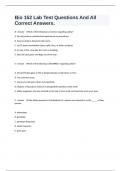Bio 152 Lab Test Questions And All
Correct Answers.
B - Answer Which of the following is incorrect regarding safety?
A. Do not perform unauthorized experiments or procedures
B. Food or drink is allowed in lab rooms
C. Let TA know immediately about spills, fires, or other accidents
D. In case of fire, evacuate the room or building
E. Store all back packs and bags out of the way
E - Answer Which of the following is INCORRECT regarding safety?
A. Discard broken glass in the in designated glass trash boxes or bins.
B. Use common sense.
C. Leave your lab space clean and organized.
D. Dispose of hazardous material in designated hazardous waste trash.
E. Safety eyeglasses can stay perched on the top of your head, and need not cover your eyes.
E - Answer All the alleles present in all individuals in a species are referred to as the _____ of that
species.
A. phenotype
B. genotype
C. genotype frequency
D. allele frequency
E. gene pool
,D - Answer Recall that in Mendel's garden peas, the yellow gene determines flower color, with the A
(yellow) allele dominant to the a (green) allele. In a population of 200 plants, the genotype frequencies
are 50% AA, 25% Aa, and 25% aa. What are the allele frequencies?
A. 50% A, 25% a
B. 50% A, 50% a
C. 87.5% A, 12.5% a
D. 62.5% A, 37.5% a
E. 75% A, 25% a
C - Answer PKU (phenylketonuria) is a genetic metabolic disorder in humans that can cause mental
disability and other complications. An estimated 1 out of every 10,000 babies born in the U.S. has PKU
(1/10,000 = 0.0001). The gene associated with PKU has two alleles, one dominant and the other
recessive. Individuals who have a homozygous recessive genotype have the disorder while individuals
with homozygous dominant and heterozygous genotypes do not. However, heterozygous individuals
carry a recessive allele. Thus, if two heterozygous individuals mate, there is a 1 in 4 chance that their
offspring will inherit two recessive alleles and have PKU. Interestingly, the gene for PKU is considered to
be in Hardy-Weinberg Equilibrium in the United States.
For every 10,000 individuals, approximately how many individuals are carriers (heterozygotes) of PKU in
the U.S.?
A. 0
B. 1
C. 200
D. 5000
E. 9999
D - Answer PKU (phenylketonuria) is a genetic metabolic disorder in humans that can cause mental
disability and other complications. An estimated 1 out of every 10,000 babies born in the U.S. has PKU
(1/10,000 = 0.0001). The gene associated with PKU has two alleles, one dominant and the other
recessive. Individuals who have a homozygous recessive genotype have the disorder while individuals
with homozygous dominant and heterozygous genotypes do not. However, heterozygous individuals
carry a recessive allele. Thus, if two heterozygous individuals mate, there is a 1 in 4 chance that their
, offspring will inherit two recessive alleles and have PKU. Interestingly, the gene for PKU is considered to
be in Hardy-Weinberg Equilibrium in the United States.
Given that PKU is in Hardy-Weinberg equilibrium in the United States, which of the following statements
is LEAST likely to be true?
A. The number of homozygous individuals with PKU in other countries is also about 1 in 10,000, meaning
gene flow into and out of the United States population does not change the genotype or allele
frequencies in the population.
B. Chance effects due to genetic drift are negligible, given approximately 320,000,000 people reside in
the United States.
C. People do not choose to mate based on whether individuals have PKU, given the disorder is easily
treated and results in no phenotypic abnormalities.
D. Individuals with PKU do not survive into adulthood, and thus do not pass the recessive PKU allele onto
the next generation.
C - Answer Cystic fibrosis is an inherited disease characterized by the buildup of thick, sticky mucus that
can damage the body's respiratory and digestive systems. Cystic fibrosis is a recessive condition, meaning
that only homozygous recessive genotype (ff) individuals have the disease. Homozygous dominant (FF)
and heterozygous individuals (Ff) do not have cystic fibrosis, but heterozygotes carry one recessive allele.
In the United States, the disease occurs in approximately 1 of 2,500 Caucasian newborns. Assuming the
gene for cystic fibrosis is in Hardy-Weinberg Equilibrium, answer the following questions. What is the
approximate frequency of Caucasian carriers (heterozygotes) in the population?
A. 0.02
B. 0.0004
C. 0.04
D. 0.98
E. 0.0025
B - Answer Cystic fibrosis is an inherited disease characterized by the buildup of thick, sticky mucus that
can damage the body's respiratory and digestive systems. Cystic fibrosis is a recessive condition, meaning
that only homozygous recessive genotype (ff) individuals have the disease. Homozygous dominant (FF)
and heterozygous individuals (Ff) do not have cystic fibrosis, but heterozygotes carry one recessive allele.




